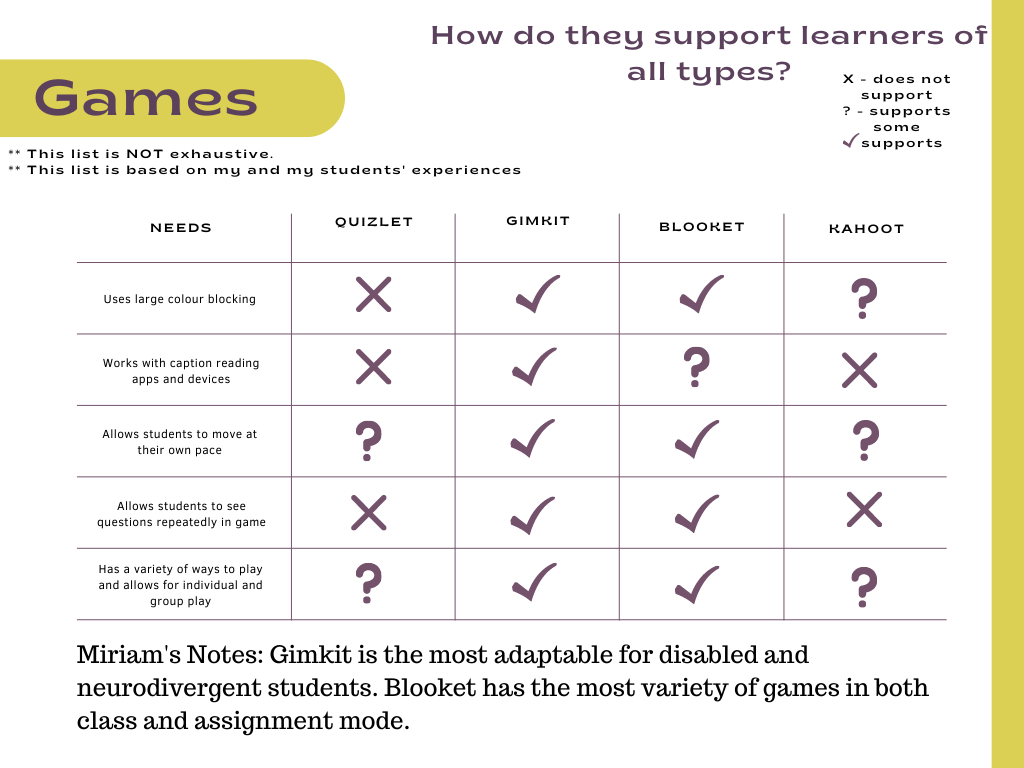|
Below is a quick reference tool I made comparing these resources. This post will be updated when I have more time :)
0 Comments
There is something you should know about me: I L.O.V.E. stationery. It is a sort of special interest of mine and I am proud to say I could make you a pen recommendation for almost any need you have. I have incorporated stationery into my practice as a teacher and as a support for neurodivergent students as well as disabled students. My hope with this post is to provide a few different ways you can incorporate highlighters into your practice that support students and you. Sensory Note Taking StationI got this idea from a website that specialised in disability education/special education needs and supplies. I ultimately formed my own way of doing it and my students have appreciated it. There are lots of ways to take notes and keep track of things in a classroom and some teachers require it done a certain way. I was one of the kids who, when I didn't understand a class or topic (*cough* Biology *cough*), would completely redo my notes at home using markers, stickers, highlighters, etc. Whatever your practices and policies are regarding notes, some students have different needs and providing a sensory note taking station can support them! The idea is to support sensory needs (sight, sound, smell, etc.) through readily available stationery supplies. Here is what is in my cart (picture forthcoming as I don't have access to my classroom over the summer):
If a student needs supplies that support a limb difference or needs help gripping smaller objects this can help make the difference for them. Students should also be allowed to use a device when appropriate for note taking. I know that I prefer, for example, a paper notebook for my academic notes but I use my iPad (I use Notability) for professional notes/teaching notes, and I use Google docs for most professional brain storms. I also keep a variety of planners for different needs too (Plum planner, Google Calendar/Keep, and my bullet journal). It may seem excessive for some people, but for those who are neurodivergent it is an amazing experience. Highlighters for AssessmentsThe other major way that I use highlighters is for assessments for students who need accommodations. While any student may need this for a variety of reasons, I've used this in the past to support students who:
I'd love more ideas to add to this! If you try using highlighters in this way, let me know how you use it! Note: I've written before repeatedly about things like retakes and RRR on my Latin blog, Pomegranate Beginnings. As PBP is undergoing some changes, I am opting to post this update here as part of this series. I feel it fits both discussion of Latin and working with all kinds of learners however. IntroductionRetakes can be a sticky subject for teachers. I've heard many reasons as to why retakes should be given and why they shouldn't. I've even addressed some of these in previous posts (see above). What I want to consider today is how retakes can harm students and particularly neurodivergent and disabled students and, more importantly I think, how we can use this vital tool to support them instead. The ScenariosI'd like to take a look at a few scenarios. Some are things I've heard about in general classrooms and some are things I've done in the past. I want to be clear that I am, in no way, trying to target any particular teacher and, more importantly, that none of us are perfect (I am far from it). Rather, I'd like to bring a different perspective to these practices that are often considered "standard" or even "best" in certain cases. Format General Topic. Scenario. My thoughts.
To put it bluntly...These kinds of retakes really only serve a specific type of student:
So... what can we do? The answer!There is no one answer. I know that isn't the ideal response, especially as teachers who are responsible for multiple students (I have an average of 150-180). But, hear me out. The simple answer is: flexibility and adaptation... on the teacher's part. I was afraid when I realised this because I wondered how much extra work it would put on me. After a few years of working this way I realise... it doesn't. It isn't something I can put in a single blog post or provide a template for, however. But... let me address each of the students we talked about in our scenarios:
I wish there were a simple answer, but there isn't because we don't teach computers, we teach human beings. Education and testing, in particular, have largely and historically favoured the neurotypical, affluent, and gifted student when they are the students who often succeed without any help or intervention. As educators we should be working to ensure progress for all types of learners.
|
This page is dedicated to my compilation of ideas and resources. You can find my sources either in these posts or listed under the other pages in this menu.
Archives
June 2022
Categories
All
|

 RSS Feed
RSS Feed
